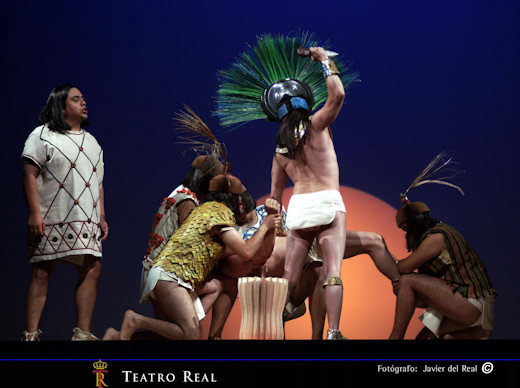Other Links
Editorial Board
-
Editor - Bill Kenny
Assistant Webmaster - Stan Metzger - Founder - Len Mullenger
Google Site Search
SEEN AND HEARD INTERNATIONAL OPERA REVIEW
C.H.Graun - Montezuma:
Soloists, Concerto Elyma. Coro de Ciertos Habitantes. Conductor: Gabriel Garrido. Teatros del Canal de Madrid. 15.09.2010. (JMI)
Direction:
Claudio Valdés Kuri.
Sets: Herman Sorgeloos.
Costumes: Jimena Fernández.
Lighting: Carsten Sander.
Cast:
Montezuma: Flavio Oliver.
Eupaforice: Lourdes Ambriz.
Tezeuco: Rogelio Marín.
Pilpatoé: Lucía Salas.
Erissena: Lina López.
Hernán Cortés: Adrian-George Popescu.
Narváez: Christophe Carré.

Production Picture © Javier del Real
The opera season at the Teatro Real opened with a visiting company’s Yevgeny Onegin and continues that way Montezuma. If the opening result was not particularly exciting, sadly the season continues by moving from A remarkable failure to something absolutely dismal.
Carl Heinrich Graun was a German 18th century composer who wrote no less than 36 operas, none of which have been performed in recent years. Montezuma is one of the late operas he wrote as Kapellmeister at the Prussian Court of Frederick II or Frederick the Great, an enlightened (or what counted as “enlightened” at the time) monarch who wrote the libretto of this opera, presented as the clash between the goodness of "savage" and the barbarity of "civilized". Voltaire’s influence is obvious.
The musical quality of this work is not truly outstanding, despite some interesting moments, but in the end it is too monotonous, especially in the second of its three acts. It isn’t, in any case, the musical interest that has led to its revival, but rather the interests of Mexico to celebrate the 200th anniversary of the independence of the Latin American republics. Obviously, this opera offers a too simplistic view of the conquest of Mexico, courtesy of Enlightenment-naïveté, and it comes as a complement for music to what they represent in painting the famous murals by Diego Rivera at the Palace of Government of the Mexican capital.
Whatever gave Gerard Mortier the idea to bring this opera to Madrid? It is just a cheap performance, a very cheap one, and its result has probably been positive only in financial terms.
This same production visited the Edinburgh Festival last month and the reviews were not too good. Here you can read what Simon Thompson wrote for Seen and Heard. I would only add that the stage work is more a kind of semi-staged version and that would correspond perfectly to the concept of “low budget”, if we were referring to some airlines.
The musical direction was entrusted to Argentinian conductor Gabriel Garrido. In a rather strange decision he added as a final page “Albricias Mortales” by the baroque Mexican composer Manuel de Sumaya. His reading had a certain intensity, although a long way from what other of his colleagues today offer in this baroque music.
Of course neither the score nor singers helped him and it is more than difficult to succeed in baroque operas with very poor singers. Who chose them is another part of the problematic result.
The cast was exactly the same offered in the Edinburgh Festival last month. Many among the singers were Mexican and of truly poor quality. Here the "low budget" concept strikes again.
The best known cast member was countertenor Flavio Oliver, who played the role of Emperor Montezuma. He was also the best singer on stage, which given the average quality isn’t saying much. For one, his high register is none too attractive, which can hamper a countertenor.
Mexican soprano Lourdes Ambriz was Eupaforice, Montezuma’s fiancée, showing a voice of rather poor quality with no agility.
There were two more countertenors, Romanian Adrian-George Popescu as Hernán Cortés and French Christophe Carré as Narváez. Both were under par. The rest of the cast, Mexican, also left much to be desired.
The Canal Theatre offered empty seats. The reception as polite but short. Mr. Valdés did not even take his bow; perhaps wisely. If there is a silver lining to the season so far, it’s that things can only get better, and I hope that Mahagonny, the first true title due to Mr. Mortier’s own doing, will be the actual beginning of a successful opera season, after all.
José M Irurzun
